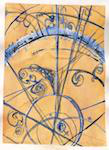Speaker
Description
A two-component (soft + hard) model (TCM) of hadron production in high-energy nuclear collisions has been applied to $p_t$ spectra, particle densities on $\eta$, 2D angular correlations and total yields from p-p, p-A and A-A collisions and provides a self-consistent description of charge-multiplicity and collision-energy dependence for a broad array of data. The TCM provides alternative explanations for some observed data trends such as mean-$p_t$ vs $n_{ch}$ and underlying event (UE) vs jet trigger condition. The TCM appears to be in conflict with hadron production models that assume a single component such as PYTHIA (based on multiple parton interactions or MPIs) or freezeout from a flowing bulk medium characterized as a QGP. TCM results also conflict with recent claims of "collectivity" (flows) in smaller collision systems. In this talk I compare results from the PYTHIA Monte Carlo and the TCM with a view to better understanding some emerging conflicts.




